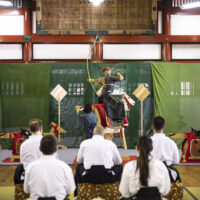Zen Training: Nurturing Mindfulness and Inner Peace

In our fast-paced, modern world, where distractions abound and stress levels soar,
the ancient practice of Zen training offers a path to tranquility, mindfulness, and
profound self-discovery. Rooted in Zen Buddhism, this practice invites individuals to
embark on a transformative journey of mental clarity and inner peace. If you can
come to Nikko, you may have a chance to explore the essence of Zen training, its
origins, principles, and how it empowers individuals to cultivate mindfulness and
lead more fulfilling lives.
Origins of Zen Training
Zen, derived from the Chinese word “Chan,” is a school of Mahayana Buddhism
that emphasizes direct experience and the practice of meditation as a means of
attaining enlightenment. It emerged in China in the 6th century and was later
introduced to Japan in the 12th century, where it took root and flourished. Zen’s
teachings were greatly influenced by Taoism, and its core principles are rooted in
simplicity, mindfulness, and direct insight.
Zazen: The Heart of Zen Practice
At the core of Zen training is zazen, the practice of seated meditation. Zazen
involves finding a quiet and serene space, usually in a specific meditation posture,
and focusing on the breath and present moment. The goal is to quiet the mind,
letting go of thoughts and attachments, and simply “be.” This direct experience of
reality is believed to lead to profound insight and awakening.
Mindfulness and Awareness
Zen training places great emphasis on mindfulness and awareness in everyday life.
Practitioners are encouraged to extend the principles of meditation into their daily
routines. Whether eating, walking, or engaging in ordinary activities, mindfulness
enables individuals to be fully present, savoring each moment without attachment
or distraction.
Koans: Puzzles of Enlightenment
Another unique aspect of Zen training is the use of koans, paradoxical statements
or questions designed to transcend logical thinking and lead to a deeper
understanding of reality. Koans, such as “What is the sound of one hand clapping?”
or “What was your original face before you were born?” challenge the intellect and
provoke contemplation, ultimately guiding practitioners toward a state of
enlightenment.
Teacher-Student Relationship
Zen training often involves a close relationship between a Zen master (roshi) and a
student (disciple). This relationship is characterized by guidance, dialogue, and the
transmission of wisdom from teacher to student. The roshi provides insights and
challenges the student’s understanding, guiding them on their spiritual journey.
Benefits of Zen Training
Zen training offers a multitude of benefits for practitioners, including:
Stress Reduction: Zen meditation helps alleviate stress and anxiety by
promoting relaxation and mental clarity.
Enhanced Focus: Regular practice of mindfulness improves concentration
and cognitive function.
Emotional Resilience: Zen cultivates emotional stability, allowing
practitioners to respond to life’s challenges with equanimity.
Greater Self-Awareness: Through introspection, Zen training helps
individuals gain a deeper understanding of themselves and their place in the world.
Cultivation of Compassion: Zen fosters empathy and compassion for
oneself and others, promoting harmonious relationships.
Zen training is a profound and transformative practice that has been passed down
through generations for centuries. It offers a timeless path to mindfulness, inner
peace, and enlightenment. Whether you’re seeking respite from the chaos of daily
life, a deeper understanding of existence, or simply a way to enhance your mental
well-being, Zen training invites you to embark on a journey of self-discovery and
awakening, ultimately leading to a more balanced and fulfilling life.







